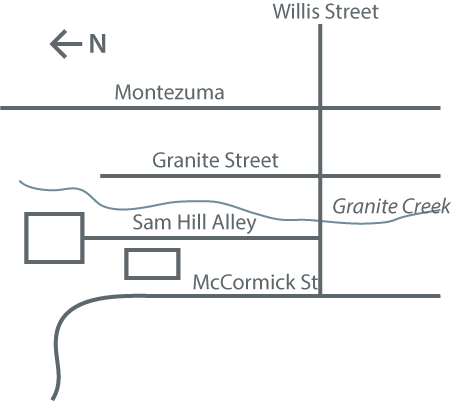This is a sort of update/rewrite of a speech Emilie Finn gave at Yavapai College on Martin Luther King Day, 2006. She was a full-time worker at the Garage then; now she is an Episcopal priest in Surprise, AZ. I have her permission for the changes made, which include substituting me for the first person narrator. After all, I am her mother.
“The Homeless”
This is a silly topic.
I don’t know anything about “the homeless.” I only know the people I hang out with almost every day. A few volunteers and I host Quixote’s Garage; a safe place for anyone who needs somewhere to be during the day. Over the 15 years that it has been open we have met literally thousands of men and women who, for whatever reason, find themselves in need of a place like ours: Someplace to relax, feel safe, get out of the weather, have a cup of the best coffee in town free, or just sit and talk.
Not all of our guests are homeless. Many do not live in a building that they pay for or have paid for. Some have apartments, but no place they feel at home. Some have no address, sleep outside, and feel at home.
“The homeless.”
Homeless is not a noun. It is an adjective that can be used to describe individuals. For instance, a local woman who by her own admission screwed up as a teenager, became an addict, had children she gave up for adoption. A man who came to Prescott maybe 20 years ago, had a job and a place to live, got cancer and lost all of that. He survived the cancer, but not loss of self respect and dignity that comes with being poor and unable to pay your own way. And the vets who come to Prescott damaged by their time in the military, and try as they might they cannot get housing, so they sleep wherever they happen to end up at the end of the day.
If those of you who support the garage stop giving me money to pay the rent, I may join the ranks of “the homeless.”
Anyone can get sick, lose a job, get a divorce, and yes, become addicted and/or mentally ill. Perhaps it is this fear that we, too, are fragile – that maybe we are not as secure as we think – that causes us to box up people who don’t live in houses and slap a label on them. “The homeless.” Them. Not us.
I could tell you what we can do to help, but I think you already know: Affordable housing or at least free shelters, medical care for everyone, jobs that pay a living wage for those able to work, and so on. And I could outline the steps necessary to get this accomplished. And then everything will be all right, right?
No. We need all that, and those working toward it are doing good and meaningful work. But even if we get it all, we will not end homelessness in Prescott or anywhere else. In fact, I don’t think we can. After all these years, I have no solutions and I don’t think there are any. A solution implies a problem and creates a new label we can stick on anyone who doesn’t fit in our idea of society.
So here we are with “the homeless problem.” We have turned a group of people into a thing. Not just any thing, but a BAD thing. Something undesirable that we have to fix – or get rid of. Certainly something that has very little to do with us, our families and friends, and our day-to-day responsibilities.
I hear this kind of language and the attitude that underlies it from people I like and identify with. People who support the garage and are working to help others. Sometimes I hear it coming from my own mouth. But then I open the garage in the morning and talk and laugh with the guys, and play cards with some of them and tell many of them for the umpteenth time to get a plate.
We become a family of sorts (see the quips) and I am surprised again and again to remember that people are not a problem to be solved. They are my friends with their own experiences, problems, hopes and dreams.
They are us and we are them.

